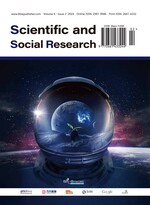Abstract
To describe the place of singularity in scientific research with the Rorschach test, 85 studies from Spanish-speaking countries published between 2010-2021 are compiled, analyzed, and classified with the “subject approach mode” described by Meneses, and identified for longitudinal trends. The results indicate a growing number of studies using Rorschach in the region with the systematic and stable presence of subject approach considering their singularity. This paper discusses whether the trends represent significance in research with Rorschach in the Spanish-speaking world, compared to studies in the English-speaking world, giving subjects the possibility of being considered in their complexity. It also proposes that the region presents an opportunity to produce research and theoretical models that take advantage of the comprehensive possibilities granted by the Rorschach test as a projective method.
References
Meneses P, Sotomayor B, Yáñez M, et al., 2021, How does Rorschach Research in Latin America and Spain? A Bibliographic Review of 10 Years of Scientific Publications. Revista Sul-Americana De Psicología, 9(2): 57–81. https://doi.org/10.29344/2318650X.2.3053
Bernstein J, 1964, 2 Psychologies. Universidad Nacional del Litoral. https://bibliotecavirtual.unl.edu.ar:8443/handle/11185/4441
Salas M, 2005, Explanation in the Social Sciences: Timeless Considerations against the Methodological Dualism in Social Theory. Rev. Reflections, 84(2): 51–60. https://revistas.ucr.ac.cr/index.php/reflexiones/article/view/11421/10770
Cuadra R, 2014, A Note on Complexity and Qualitative Paradigm. Liberabit, 20(2). http://www.scielo.org.pe/scielo.php?pid=S1729-48272014000200015&script=sci_arttext&tlng=en
Sandia L, 2003, The Nomothetic and Ideographic Perspectives in the Treatment to the Reality Studied by the Social Sciences. Orientación. y Consulta, 9(1). http://ctinobar.webs.ull.es/1docencia/Cambio%20Social/IDEOGRAFIA.pdf
Gonzalez J, Ruiz P, 2011, Qualitative Versus Quantitative: Methodological or Ideological Dichotomy? Index de Enfermería, 20(3). https://scielo.isciii.es/scielo.php?script=sci_arttext&pid=s1132-12962011000200011
Sendin MC, 1990, Factor Structure of the Rorschach Test: Intergroup Comparison. Clinica y Salud, 1(2): 143–152. https://journals.copmadrid.org/clysa/art/a5bfc9e07964f8dddeb95fc584cd965d
Sanchez F, 2019, Epistemic Foundations of Qualitative and Quantitative: Consensus and Dissent. Journal Digital Research in University Teaching, 13. http://www.scielo.org.pe/scielo.php?pid=s2223-25162019000100008&script=sci_arttext
Ugalde N, Balbastre F, 2013, Quantitative and Qualitative Research: Looking for the Advantages of the Different Research Methodologies. Revista de Ciencias Económicas, 31(2). https://revistas.ucr.ac.cr/index.php/economics/article/view/12730
Rodriguez C, 1990, Current Status of the Rorschach Test. Anuario de Psicología, 45: 89-99. https://dialnet.unirioja.es/servlet/articulo?codigo=2945103
Meneses P, Sotomayor B, Yáñez M, et al., 2021, How does Rorschach Research in Latin America and Spain? A Bibliographic Review of 10 Years of Scientific Publications. Revista Sul-Americana De Psicología, 9(2): 57–81. https://doi.org/10.29344/2318650X.2.3053
Mihura J, Bombel G, Dumitrascu N, et al., 2019, Why We Need a Formal Systematic Approach to Validating Psychological Tests: The Case of the Rorschach Comprehensive System. Journal of Personality Assessment, 101(4): 374–392. https://doi.org/10.1080/00223891.2018.1458315
Alessandro M, Alonso H, Passalacqua A, 2000, Comprehensive System-Argentine Rorschach School Similarities and Differences. Free Communication at the VI European Rorschach Congress (E.R.A. 2000).
